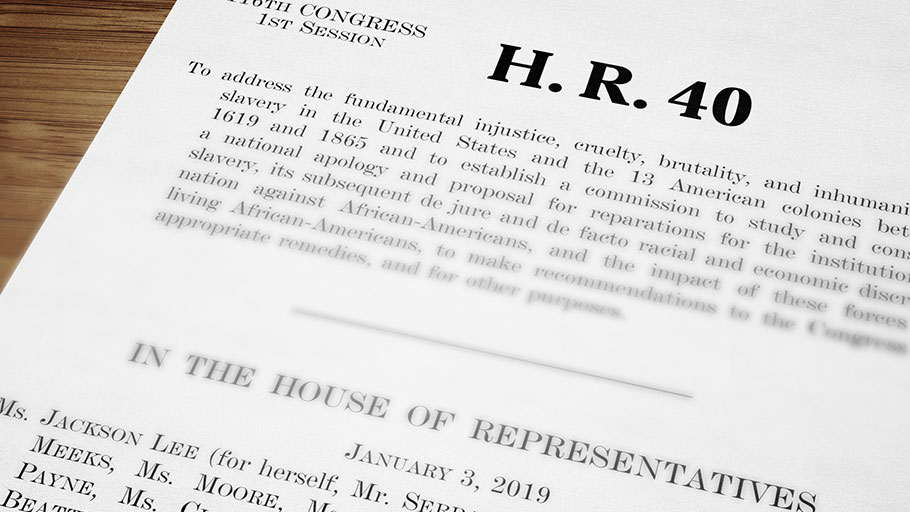Editor’s Note:
The ongoing mass protests against police violence and racial inequality demand that we no longer be comfortable with the status quo. We need a national reckoning with structural racism in all its forms, which permeate every aspect of our society and create separate conditions for Black and white life in the US.
House Resolution (HR) 40 is the answer to the moment we are in. It would establish a commission to study the brutality and inhumanity of slavery, its legacy, and its ongoing, contemporary impacts, as well as develop proposals for redress and repair. The bill has been considered in the legislative chambers for over 30 years, but it has never had as much momentum towards passage as it has during this Congressional session. In the past, only a handful of House representatives supported the measure each legislative session. Today, there are 139 co-sponsors and 18 co-sponsors for the Senate companion bill, S. 1083.
The US government has a responsibility, well defined in international human rights law, to adequately account for one of the nation’s most egregious human rights violations –the enslavement of Black people, address ongoing harms, and provide redress and repair.
We can no longer wait for this critical step towards a truthful accounting, and reconciliation.
In the spirit of Rev. Dr. Martin Luther King, Jr., stemming from his seminal text, “Why We Can’t Wait,” we must communicate to Congressional leadership that passing HR 40 is essential if we are to use the momentum of this moment to finally end racial inequality.
If you or your organization want to sign onto this call, please use the following form to sign onto the attached statement indicating your organization’s (or individual) support in moving this country forward. We hope to garner as much support as possible within this timeframe, so please share widely with your networks. Please respond to the form by no later than COB, Wednesday, July 29.
Statement for Sign On
House Resolution 40
Why We Can’t Wait | #ReparationsNow
Rev. Dr. Martin Luther King, Jr.’s seminal text, “Why We Can’t Wait,” was written in 1963 and has emerged as more prescient than ever in this moment. The multi-racial, cross-generational protests across the United States have ushered in a national reckoning on structural racism—and a sea change in attitudes. A majority of people in the US support the protests and believe that racism is a serious issue in this country. Addressing it can no longer wait. People in the US are now more eager than ever to pull back the curtain on institutions to see whether they have helped to advance or stall racial progress, and the US Congress is no exception. One bill in particular can demonstrate support for meeting this moment in a reasonable, rational, and compassionate way: House Resolution (HR) 40.
The current social movement, the largest in US history, is in response to problems that are 400- plus years in the making—issues intractably tied to the enslavement of Black people in the United States. People in the US are increasingly aware that there is no way forward from the current strife without addressing one of the nation’s most egregious violations of human rights—the institution of slavery. HR 40 would establish a commission to investigate the legacy of slavery and its ongoing harms as well as come up with proposals to Congress for redress and repair.
HR 40 is simply a first and reasonable step—it is a commitment to truth-telling, studying and coming up with ideas to treat the disease, rather than a commitment to the treatment itself. The bill has been introduced for 30 years—yet for 30 years, it has languished. If the protests have demonstrated anything, it is that action cannot wait.
- HR 40 can’t wait, when Covid-19 is harming Black people in the US at three times the rate of white people, with disparities across all age groups and areas of the
- HR 40 can’t wait, when Black infants are more than twice as likely to die as white infants— making the disparity worse than it was in 1850, when Black people were
- HR 40 can’t wait, when heads of white households who only have a high school diploma are sitting on almost 10 times more wealth than Black households with the same level of If Black families did “everything right,” the advanced degrees would still allow them to accumulate less wealth than a white family whose head of household only had a high school diploma. They’d be disproportionately denied mortgages and fair lending rates regardless of their incomes.
- HR 40 can’t wait, when the gap between Black and white wealth is as large as it was in
- HR 40 can’t wait, when school districts that serve higher populations of Black and brown students receive $23 billion less in funding compared to mostly white school
- HR 40 can’t wait, when Black students are disproportionately punished and criminalized in their schools, beginning in preschool, facing greater rates of suspension, expulsion, and arrest compared to their white peers, often for the same
- HR 40 can’t wait, when experts say that systemic racism is leaving Black people with symptoms of post-traumatic stress disorder, harm to their immune systems, premature aging, and in Washington, DC, life expectancies that are a staggering 9 years shorter than white residents’—all while Black people are less likely than white people to have access to mental health services and more likely to receive poor quality care.
- Don’t ask us to wait, when the suicide rate for Black children is rising faster than for any other racial and ethnic group, and the second-leading cause of death for Black youth aged 10 to
- Don’t ask us to wait, when governments’ infrastructure plans have racially segregated cities across the country, creating separate conditions of life for Black and white people through “urban removal,” highway construction, restrictive zoning laws, and use of eminent
- Don’t ask us to wait, when as a result of government-imposed segregation, health outcomes in Black neighborhoods are disproportionately impacted by heat levels and environmental hazards due to the close proximity to places like oil refineries, trash incinerators, construction sites, and waste dumping
- Don’t ask us to wait, when even after the broken promise of “40 acres and a mule,” formerly enslaved Black people and their descendants managed to own 14 million acres of land at the start of the 20th century, while today at least 90 percent of that land is not in their possession, due to systemic oppression, targeted racist violence, and an inequitable legal
- Don’t ask to us wait when the property tax system has discriminated against Black families throughout history and across the country, saddling them with an unfair tax burden – and when to this day, Black people pay 13 percent more in property taxes than similarly situated white
- Don’t ask us to wait, when even dying costs Black people more — end-of-life care under Medicare is $7,100 more expensive for Black individuals compared to their white
- Don’t ask us to wait, when Black people are more than six times as likely as white people to languish behind bars for possessing drugs for personal use, even though Black and white people use drugs at the same rates.
- Don’t ask us to wait, when 1 in 1,000 Black men and boys in the United States can expect to die at the hands of police in a country where it’s rare for police officers to face legal consequences — and even rarer to face a conviction — for killing Black
As Dr. King argued in 1963, the movement for racial equality and equal rights under the law calls on us to move courageously towards repair. We can’t get back those years and wages that Black people lost while in bondage and unfairly behind bars. We can’t recover the lives lost to systemic anti-blackness and heinous racial terror. We can’t undo the trauma that has wreaked havoc on Black communities and bodies. But what we can do is pass HR 40. It is what the moment requires. It is an opportunity to start moving the United States out of this deep quagmire of inequality and to finally make it whole.
Sincerely,
[Undersigned Organizations]















